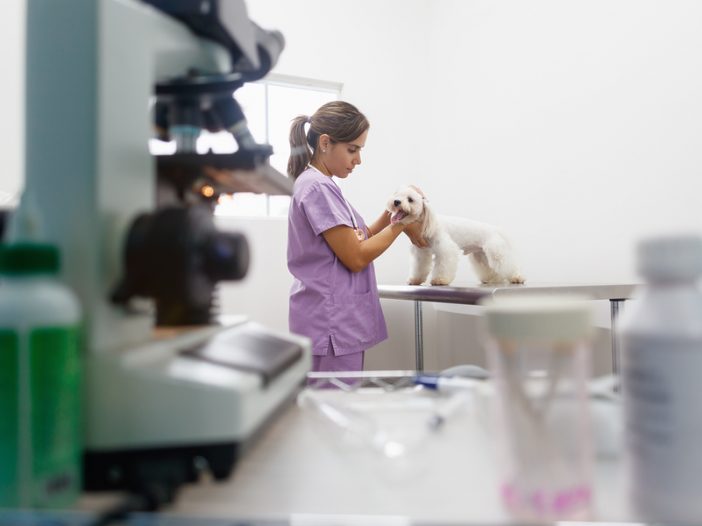
I love my technicians. They are the most amazing people and have skills that combine every single specialization in the human nursing field. They don’t get paid enough, in my opinion, and deserve more respect than most clients give them. They are the people we should aspire to be like.
When I was fifteen I started working at my local veterinary clinic as kennel staff. I was always so excited when the technicians asked me to help them hold an animal or even trim nails. They were so eager to show me some of the tasks they do on a daily basis. In their spare time, they showed me how the in-house laboratory machine worked and how to read fecal samples. As I continued to work my way up to technician assistant, they continued to show me how many different things they knew how to do and forever instilled my respect for their job.
I don’t know how many of you worked at veterinary clinics before accepting your position in veterinary school. I could typically tell during 4th year which students had that experience versus not. They respected the technicians. The ones who stepped over vomit and instructed the technicians to clean it up, clearly they never learned that respect. But let’s get back to the point- the skill set I’m discussing isn’t how to clean up vomit… well maybe it is.
I’ve learned a few things from my fellow technicians that help me with my daily routine that I think we could all benefit from. I think they have helped me become a self-sufficient veterinarian who has the badass skills of a technician.
1. Learn to Multitask
We all are pretty good at multi-tasking. Some much more than others. Technicians have multiple jobs through a clinic and do them all extremely well. I’ve seen a technician run blood work, read a fecal, CBC slide, and ear cytology all within a matter of 5 minutes. Plus that technician still had patients to worry about. Sometimes we get wrapped up in whatever cases we are in and forget that other things are happening around us.
2. Your DVM doesn’t mean you can’t clean up feces or urine.
Be helpful. When there are no other technicians around, lend a hand to keep the balance of the day going. That might mean cleaning up the large pile of feces left by an aggressive dog but if you lend a hand once in a while your technicians will appreciate it and it is a humbling experience.
3. Compassion!
We all have loads of compassion but there is a huge difference between how technicians tend to their in-house patients and how we interact with them. We tend to keep track of the medical issues of a case versus emotional support to the patient. I’ve seen technicians hang out with their patients in the kennels, spend their lunches snuggling with the feline cases, and overall just giving them a little extra emotional encouragement. A well-loved patient tends to recover a little quicker than one that only gets touched during morning rounds.
4. Be flexible.
For those veterinarians working ER shifts, you know what I’m talking about. Sometimes a day isn’t going to go as you planned it. Some veterinarians get so stressed out by work-ins and unplanned surgeries. What do the technicians do? They push on through. They are supportive and will stay extra hours to help out, even if they aren’t scheduled to do that. Now I don’t think we should be so flexible to work ourselves to death, but there are steps to calmly approach bumps in the road without pulling your hair out.
5. Strengthen your skills.
We can remove spleens and fix broken bones, but sometimes those basic skills get forgotten. Most clinics have technicians that do blood draws, obtain urine, read stool samples, place IV catheters and that means you may not be doing those at all anymore. It never hurts to relearn and strengthen those skills. They can come in handy if you work on-call alone and need to place a catheter in a seizing dog or a dehydrated puppy. Every now and again ask a technician if you can draw your own blood or read that CBC slide. It will greatly improve the way you practice medicine.
There are many more skills that technicians can teach us. Remember, they are the backbone of the clinic and many of us would not be where we are today without the support of a technician.
The views and opinions expressed in this article are those of the author and do not necessarily reflect the position of the DrAndyRoark.com editorial team.